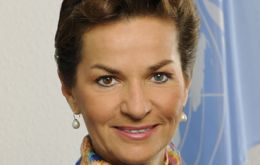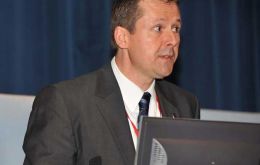MercoPress. South Atlantic News Agency
Tag: Climate change
-
Monday, November 25th 2013 - 07:24 UTC
Last minute compromise and flexible wording saves UN climate talks in Poland

UN climate talks in Poland have ended with delegates reaching a compromise on how to fight global warming. After 30 hours of deadlock, they approved a pathway to a new global climate treaty in Paris in 2015. The agreement was achieved after a series of last minute compromises often involving single words in draft texts.
-
Thursday, November 29th 2012 - 13:02 UTC
Post-Sandy, why urgent preparation is needed for storms of the future

By Lord Julian Hunt and Professor Johnny Chan.(*) - The devastation wrought by super-storm Sandy (253 deaths in the Americas and over 50 billion dollars in economic damage and disruption), is prompting renewed thinking about climate change and national security.
-
Tuesday, October 30th 2012 - 07:25 UTC
‘Atlas of Health and Climate’ to understand the challenges of extreme conditions

As the world’s climate continues to change, hazards to human health are increasing. The Atlas of Health and Climate, published jointly by the World Health Organization (WHO) and the World Meteorological Organization (WMO), illustrates some of the most pressing current and emerging challenges.
-
Saturday, August 18th 2012 - 05:32 UTC
Tropical fish moving south because of climate change says Australian report

Australia’s Marine Climate Change 2012, released on Friday, provides evidence of a large-scale redistribution of marine species in ecosystems around Australia. Dr Elvira Poloczanska, who led the study, says there's a lot of uncertainty about the long-term impacts.
-
Thursday, June 21st 2012 - 06:23 UTC
Rio+20: Development banks to invest 175bn dollars in sustainable transport

The eight largest multilateral development banks (MDBs) announced on Wednesday at the United Nations Conference on Sustainable Development, Rio+20, that they will invest 175 billion dollars in sustainable transportation systems over the coming decade.
-
Tuesday, December 13th 2011 - 22:32 UTC
Canada’s withdrawal from Kyoto Protocol regrettable, says UN climate official

Canada’s decision to withdraw from the Kyoto Protocol is surprising and regrettable, the United Nations climate change chief Christiana Figueres said on Tuesday, calling on developed countries to meet the commitments they recently made at the UN Climate Change Conference in Durban, South Africa.
-
Tuesday, December 13th 2011 - 17:56 UTC
With a global, comprehensive agreement still elusive, we need a new climate change 'road-map'

* By Lord Julian Hunt. The main aim of the UN climate summit at Durban, which concluded unsuccessfully on Friday/Saturday morning, was to produce an agreement about targets for emissions by developed countries, and longer term commitments from developing countries.
-
Wednesday, November 30th 2011 - 12:48 UTC
At Durban, we need to rethink the next steps to tackling climate change

The main aim of the UN climate summit at Durban, which began on November 28 and finishes on December 9, is to produce an agreement about targets for emissions by developed countries, and longer term targets from developing countries.
-
Sunday, November 27th 2011 - 01:49 UTC
Imperceptibly, the tide of debate is turning on climate change

The forthcoming Durban (Climate change) conference comes at a major crossroads in international relations, with continuing economic malaise in the West being counterpoised with the increasingly rapid shift of power to emerging economies. Mirroring this structural change is a fundamental shift in the centre of gravity of the global climate change debate that few have yet to recognize.
-
Monday, April 18th 2011 - 06:38 UTC
Arctic coastline crumbling due to effects of climate change, says German study

Arctic coastlines are crumbling away and retreating at the rate of two metres or more a year due to the effects of climate change, it has been claimed. In some locations, up to 30 metres of the shore has been vanishing every year.
